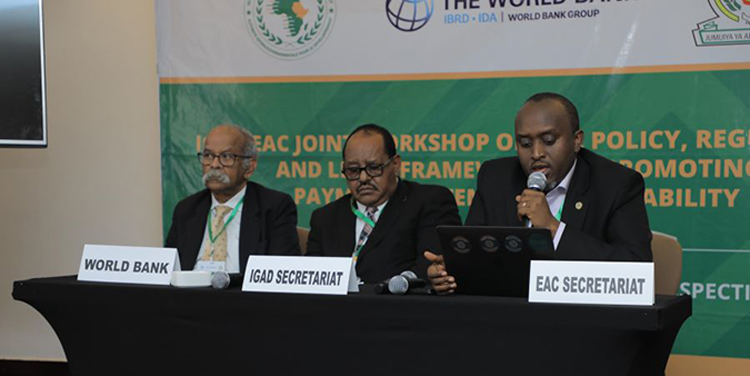In a bold step toward regional financial integration, the East African Community (EAC) and the Intergovernmental Authority on Development (IGAD) jointly convened a five-day workshop from June 30 to July 4, 2025, in Addis Ababa, Ethiopia. The workshop, supported by the World Bank, brought together central banks, digital finance experts, and senior policymakers from nine countries across Eastern Africa. The objective was clear: to build a harmonized legal, regulatory, and supervisory framework that would enable safer, faster, and more inclusive cross-border digital payments across the region.
This initiative falls under the Eastern Africa Regional Digital Integration Project (EARDIP), a flagship programme implemented collaboratively by EAC and IGAD with World Bank backing. EARDIP aims to integrate the region’s digital economy by expanding broadband infrastructure and improving the enabling environment for cross-border digital services—especially digital payments, which are vital to trade, remittances, and financial inclusion.
At the centre of discussions in Addis Ababa was the longstanding challenge of fragmented and non-interoperable payment systems that continue to constrain economic potential. While individual countries like Kenya, Tanzania, and Ethiopia have achieved commendable progress in domestic payment interoperability, the region as a whole still grapples with regulatory gaps, technical disparities, and cybersecurity threats that stifle cross-border integration.
The workshop served as a platform for technical knowledge-sharing, peer-to-peer learning, and the articulation of a shared regional vision. Dr. Mohyeldeen Eltohami, IGAD’s Director of Economic Cooperation and Regional Integration, described the gathering as a catalyst for change, stating that the collaboration between EAC and IGAD embodies the spirit of regional unity required to achieve the continent’s aspirations of digital transformation and inclusive growth. He emphasized that digital transformation is no longer a choice but a necessity and that true prosperity can only be realized when borders no longer stand in the way of opportunity.
Echoing this sentiment, Eng. Daniel Murenzi, Principal Information Technology Officer at the EAC Secretariat, underscored that digital payments form the backbone of a functioning digital economy. He noted that through EARDIP, both IGAD and EAC are working to build a digitally integrated Eastern Africa by strengthening infrastructure, services, policies, and frameworks that promote regional trade and collaboration. Murenzi stressed the need to review national payment processes, harmonize legal instruments, and enhance the interoperability of payment systems across the region.
From a global perspective, Mr. Gynedi Srinivas, Senior Financial Sector Specialist at the World Bank’s Payment Systems Development Group, highlighted the alignment between the workshop’s goals and the broader G20 roadmap to make cross-border payments faster, cheaper, and more secure. He pointed out that interoperability of fast payment systems would significantly benefit individuals and micro, small, and medium enterprises (MSMEs) by reducing transaction costs and making cross-border retail payments more efficient and reliable.
Over the course of the workshop, participants engaged in deep discussions around three strategic pillars: digital infrastructure, legal and regulatory frameworks, and regional payment integration. Among the key recommendations were the need to invest in shared digital infrastructure, embrace consumer-centric design in developing fast payment systems, establish regulatory sandboxes to foster innovation, and harmonize legal instruments across the region to unlock genuine interoperability.
Delegates from participating countries—representing central and national banks—shared their domestic experiences, offering practical insights and case studies that could guide others in overcoming barriers to digital finance inclusion. The sessions also explored the potential of emerging technologies such as artificial intelligence (AI), blockchain, and central bank digital currencies (CBDCs) for cross-border use. With cybersecurity looming large, the workshop addressed threats to payment ecosystems and called for the creation of a unified cybersecurity legal framework, along with real-time threat intelligence sharing and the establishment of cross-border cybersecurity incident response teams (CIRSTs).
Further proposals included fostering peer-to-peer attachments among central banks, designing user-friendly fast payment systems, addressing social engineering risks—especially within mobile payments—and institutionalising annual joint workshops focused on cross-border payments to sustain momentum and collaboration.
The workshop drew participants from the national payment system departments or directorates of the Bank of the Republic of Burundi, Central Bank of Djibouti, National Bank of Ethiopia, Central Bank of Kenya, National Bank of Rwanda, Central Bank of Somalia, Bank of South Sudan, Bank of Tanzania, and Bank of Uganda. The Democratic Republic of Congo was represented by its Ministry of Regional Integration. Also in attendance were coordinators of the EARDIP project from both IGAD and EAC, World Bank consultants, and a representative from the Bank of Italy (Banco d’Italia).
As the workshop concluded, it became evident that the path to a digitally connected and economically inclusive Eastern Africa lies in sustained cooperation, bold policy reforms, and joint innovation. With renewed commitment from EAC, IGAD, and their partners, the region is well on its way to redefining the future of cross-border digital payments.
This article was published by Githua Kihara, an editorial consultant for FEAFFA’s Freight Logistics Magazine. For any inquiries, please contact us via email at editorial@feaffa.com or freightlogistics@feaffa.com, or reach out to Andrew Onionga directly at onionga@feaffa.com / +254733780240.





